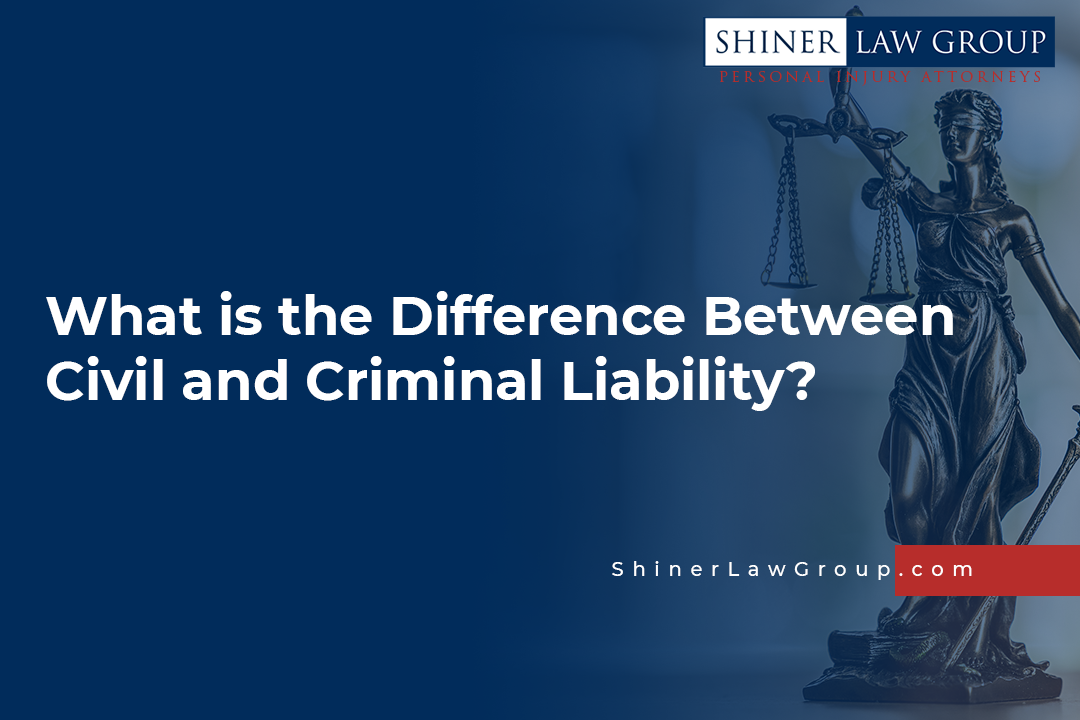Civil Law vs. Criminal Law
Our legal attorneys are often asked about the differences in how courts decide a person’s liabilities and consequences when someone is hurt. To understand this, it is important to know that legal cases in the United States are divided into two broad categories, criminal and civil.
Differences Between Civil and Criminal Law
A criminal case is filed by the government or state and led by a prosecuting attorney, while a civil case is filed by a private party to settle a dispute between another party- typically these are individuals or corporations. Criminal cases occur when someone is accused of breaking the law or committing a criminal offense- such as theft, assault, murder, etc.- and the government is deciding if and how to punish the defendant. Civil cases consist of everything else, some examples being divorce proceedings, personal injury claims, and wrongful deaths.
Stakes
A key difference between these two types of legal proceedings are the stakes. The punishments are often much more severe for the verdict of a criminal trial. Depending on the crime committed, you could be at risk to losing your freedom, reputation, and in extreme cases and certain states, your life by death penalty. In a civil trial, the most common results are some type of compensation for injuries or damages, and it’s usually monetary, although, they can also include loss of child custody or a court order to cease a particular action. In certain limited cases, a plaintiff can be awarded punitive damages- an amount intended to punish the other party- but the results are usually compensation to “right” the wrong committed.
Burden of Proof
Because the stakes are higher in criminal law, you will also find that there is a higher “burden of proof” than in civil law as well. In criminal trials, the government must prove beyond a reasonable doubt that the defendant committed the crime of which they have been accused. Compared to a civil trial, where the burden of proof is the greater weight of the evidence and is the responsibility of the civil plaintiff. This basically means the judge or jury has to believe the case is more likely true than not, or a 51-49 ratio.
Court Processes
Some other differences are lie within the court processes. For example, in a criminal trial you are guaranteed the right to an attorney even if you cannot afford one, which is not true for civil trials. Additionally, in criminal trials you are free to “plead the fifth” and not required to testify, whereas anyone can be called to witness in a civil case, even the defendant, and attorneys are allowed to speculate whether “pleading the fifth” makes you appear guilty.

Can a Case be Both Civil and Criminal?
Criminal law and civil law were designed to address different transgressions; however, they also share some similarities. A person can both break a criminal law and commit a legal wrong against a private entity with the same conduct. In other words, certain cases will have both civil and criminal trials if a victim or survivor of a crime sues the perpetrator or liable entities for civil damages resulting from it.
Due to the differences in burden of proof, the rulings on a criminal and civil case are not mutually exclusive. A person who is found “not guilty” in a criminal proceeding can still be found liable in civil court. For example, although OJ Simpson was found “not guilty” of the murder of his ex-wife and her friend in his criminal trial, a civil jury found him liable for their wrongful deaths and he was ordered to pay 33.5 million dollars to their grieving families.
Wrongful death is only one civil lawsuit that can result from the same actions covered in a criminal trial, and in Florida there are specific statutes and laws that govern this issue. Specifically, Florida Statute Section 768.21 outlines what damages can be recovered in a death case involving civil liability or negligence, and defines that the only people with the ability to make a financial recovery are the survivors or beneficiaries.
Aside from wrongful death, other examples of civil trials that can result from the same actions in a criminal trial are gross negligence and willful disregard for another person leading to their injuries. An instance of this would be if someone who was drinking and driving caused an injury after a car crash – they could be civilly liable and criminally charged.
Speak with a Civil Liability Lawyer Today
At Shiner Law Group, we focus mainly on civil cases where someone has experienced damages due to the negligence of someone else. If you or someone you loved has suffered due to a personal injury, vehicle accident, wrongful death, or any other type of damage resulting from the negligence of another, please contact one of our specialized personal injury attorneys to find out if we can assist you. You can reach us by filling out a free case evaluation, or by calling us at 800-364-4444. We are always available to help, 24/7/365.